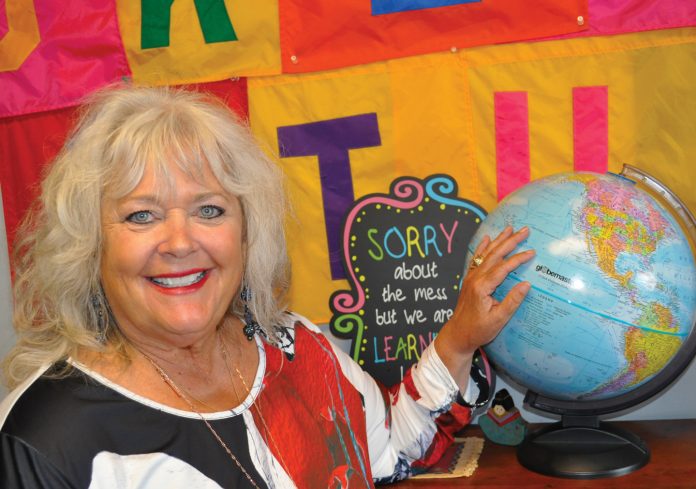
Senior educates generations
by Bobby Anderson,
Staff Writer
The sounds of children’s playful voices float through Southwinds Montessori Preschool in Norman.
Inside, the classrooms are a flurry of activity with 45 smiling faces whirring around from activity to activity.
In the background, Carol Zerboni smiles a big, beautiful proud smile.
It’s been that way more than 40 years now for Zerboni, who operates the private Montessori school along Highway 9.
And she laughs at the time when running a school and teaching children was the farthest thing from her mind.
“I just wanted a paycheck – a little extra money to have to spend,” Zerboni said of looking for a job as a young art major at the University of Oklahoma.
“I asked if they needed an art teacher and she hired me immediately.”
“I didn’t have a clue what Montessori was. Being Italian, I thought for sure I’d figure it out.”
When Zerboni figured out the Montessori philosophy hailed from Italy she was intrigued.
When she found out what it could do for young children she was hooked.
“I watched and looked at the materials and equipment and the way they were learning and it was different than anything I’d ever seen,” Zerboni said. “The materials were just incredible – beautiful. There was a purpose for everything.”
She switched her major to elementary education and then went on to Oklahoma City University to complete her Montessori training.
The textbook definition of Montessori discusses an emphasis on independence, freedom within limits, and respect for a child’s natural psychological, physical, and social development.
For Zerboni – and literally millions of children through the years – it just seems natural.
THE MONTESSORI CONCEPT
The education system originated in Italy with Dr. Maria Montessori, the second female doctor in the country’s history.
With compulsory education beginning at age seven, the streets of Rome were filled with young children with plenty of time on their hands.
With the idea that children learned 80 percent of their knowledge from birth to four, the pediatrician set up the first Montessori, Casa dei Bambini.
The program was a success, so much so that Prime Minister Benito Mussolini appointed her chairwoman of education for the country.
But during World War II she called the dictator “a fascist pig” and was booted from the country.
“She was so ahead of her time and really bright and really understood the child,” Zerboni said of her icon.
Landing in India, Montessori continued her curriculum development, carrying it all the way through high school.
To this day, Zerboni still gets questioned about what Montessori is all about.
“I tell them it’s a method of education where the teacher’s role is totally different,” Zerboni said. “It’s not teacher-driven. Your job as a teacher is to create the environment to be inviting so that the kids can go in it and move. They need to move and they need to have meaningful work … and for them to make their own choices and create independence.”
That’s why the halls at Southwinds are often a flurry of activity. To some it may seem like a classroom run amuck.
But spend a few moments observing and you’ll see children discovering the world around them through all five senses.
And they’re enjoying it as the same time.
Zerboni will tell you Montessori school kids read earlier than those in traditional school. Phonic sounds are taught at age three but it’s not done with them sitting in a hard-plastic chair for six hours a day.
“Freedom of movement is one of the biggest things that’s different from public school,” Zerboni said. “I really think sticking children that are young in desks is really not fair to the child. It is unnatural. They can’t sit. They’re not absorbing anything at all.”
Absorption is key to knowledge. Children aren’t just taught things in Montessori they experience them and store them with emotion and memory that will carry the information with them for the rest of their days.
Zerboni things a lot of that is missing in today’s schools.
“I think what we’re losing out on is we’re waiting too long to get our kids involved in Math, Reading, Science and all the basics,” she said. “They’re ready for it. They get it.”
Zerboni took her 40 years of experience and passion and poured them into her own line of instructional books.
Zeb Books was born nearly a decade ago – named after the family pet. “I’ve done the thinking about this and about what works and what doesn’t,” Zerboni said. “I’m not sure I have the only way but I know my way works because I’ve got kids reading up a storm.”
“That’s one reason people send their kids here.” And the fact that they’re having fun while learning doesn’t hurt either.













